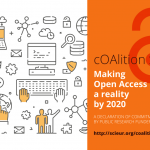Featuring the proposed concept of geowalling, highlights from World Science Day 2019, the Health Research Authority’s trip to the House of Commons and ISMPP’s support of the Open Pharma position statement
Knocking down paywalls just to build geowalls via The Scholarly Kitchen
In 2017, Elsevier received widespread criticism after proposing regional open access to its publications. It is thus surprising that Jean-Claude Burgelman, the Open Access Envoy of the European Commission who serves on the cOAlition S Executive Steering Group, now suggests that geo-specific access is used as a means of achieving open access. However, there is a good reason for that. Through its dedication to open science, Europe risks offering the rest of the world its research without receiving any reciprocal benefits. This has led to concerns over the financial implications for researchers funded by members of cOAlition S, who, in addition to having to maintain subscription costs for journals based in other continents, will also face restrictions to publishing in journals that do not offer open access options.
As proposed by Burgelman, geowalling could solve this issue, working on a principle similar to that followed by Amazon, whereby consumers are charged different prices depending on their location. This would offer people open access to articles based on their geographical location, making research freely accessible to stakeholders within Europe but not to those based in other continents, who would continue to pay to access published articles. Given the current financial and time constraints of Plan S, it is no surprise that some people are considering whether regional open access could be the answer for now. However, for a movement that has worked so hard to overcome the issue of paywalls, is building another barrier to free online access to research output really the way forward?
UNESCO recognizes the need for open science via The Publication Plan
This year’s World Science Day for Peace and Development centred on the theme of ‘Open science, leaving no one behind’. The annual event, organized by UNESCO, explored the role of society in science and the importance of involving the public in scientific debates. At the main event in Paris, attendees discussed how science could be opened up to society and the best methods for tackling global inequalities in access to research outputs.
World Science Day events took place across the globe, from Azerbaijan to Indonesia, engaging a wide range of research stakeholders. Acknowledging its role in driving the open science movement, UNESCO has stated that it will continue to raise awareness and lead global discussions on open access.
Updates from the ‘Make It Public’ consultation via Health Research Authority
During this summer’s ‘Make It Public’ consultation held by the Health Research Authority (HRA), over 700 members of the public provided comments on the HRA’s strategy to improve research transparency. As a result of this feedback, the HRA took the discussion to the House of Commons Science and Technology Committee. In a meeting in late October 2019, Sir Terence Stephenson and Juliet Tizzard updated the committee on the body’s ongoing efforts to improve research transparency and the continued need for input from individuals and organizations outside the research community.
With the help of organizations such as Sense about Science, who run the AllTrials campaign, the HRA has been working hard to improve reporting for all NHS-funded clinical trials. From February to October 2019, the reporting rate of NHS-funded clinical trials increased by one-third, demonstrating the difference that campaigns such as AllTrials can make. Despite this improvement, the article ends by highlighting the fact that raising awareness and reporting expectations is not enough. For research to be truly open, transparent practices need to become part of the daily routine of all those involved in clinical trials.
Putting the Open Pharma position statement on The MAP via The MAP Newsletter
More than 3 weeks after its launch, the Open Pharma position statement on open access is still making headlines! An article posted on The MAP earlier this week highlighted that the International Society for Medical Publication Professionals (ISMPP) supports the position statement and, like Open Pharma, remains optimistic that all research, including that funded by pharma, will be given equal opportunity to be published open access. To date, the position statement has received endorsements from 20 organizations and over 65 individuals and is available for you to read and endorse here!






